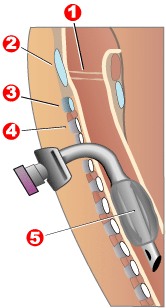
Photo from wikipedia
OBJECTIVES Describe the influence of pretreatment tracheotomy and treatment modality (surgical versus non-surgical) on oncologic and functional outcomes. MATERIALS AND METHODS Retrospective study of previously untreated advanced-stage laryngeal squamous cell… Click to show full abstract
OBJECTIVES Describe the influence of pretreatment tracheotomy and treatment modality (surgical versus non-surgical) on oncologic and functional outcomes. MATERIALS AND METHODS Retrospective study of previously untreated advanced-stage laryngeal squamous cell carcinoma patients at two academic tertiary care institutions from 1995 to 2014. RESULTS Primary outcomes evaluated were disease-free survival, disease-specific survival, and overall survival of pretreatment tracheotomy versus no pretreatment tracheotomy cohorts. Functional status, measured by tracheotomy decannulation and gastrostomy tube placement/removal, was assessed. Of the 226 patients, 31.4% underwent pretreatment tracheotomy. Five-year disease-specific survival was 72.9%, and overall survival was 48.8% for entire cohort. There was a statistically significant decrease in overall survival (p = .03) and disease-free survival (p = .02) for the pretreatment tracheotomy group compared to no pretreatment tracheotomy, which was largely explained by primary tumor stage. Pretreatment tracheotomy was associated with gastrostomy tube placement and was an independent predictor of worse odds of gastrostomy tube removal. Disease stage, distant metastasis, and age independently conferred worse odds of gastrostomy tube removal. CONCLUSION Patients undergoing pretreatment tracheotomy for primary T4 laryngeal cancer had decreased overall survival compared to patients without pretreatment tracheotomy. There was no difference in local recurrence rates based on tracheotomy status. Organ preservation with chemotherapy and radiation did not result in better functional outcomes than surgery in the pretreatment tracheotomy group as nearly half of patients treated with organ preservation remained tracheotomy dependent. Based on this data, pretreatment tracheotomy may impact oncologic and functional outcomes in advanced disease, and it should be a consideration in an informed decision-making process.
Journal Title: Oral oncology
Year Published: 2018
Link to full text (if available)
Share on Social Media: Sign Up to like & get
recommendations!